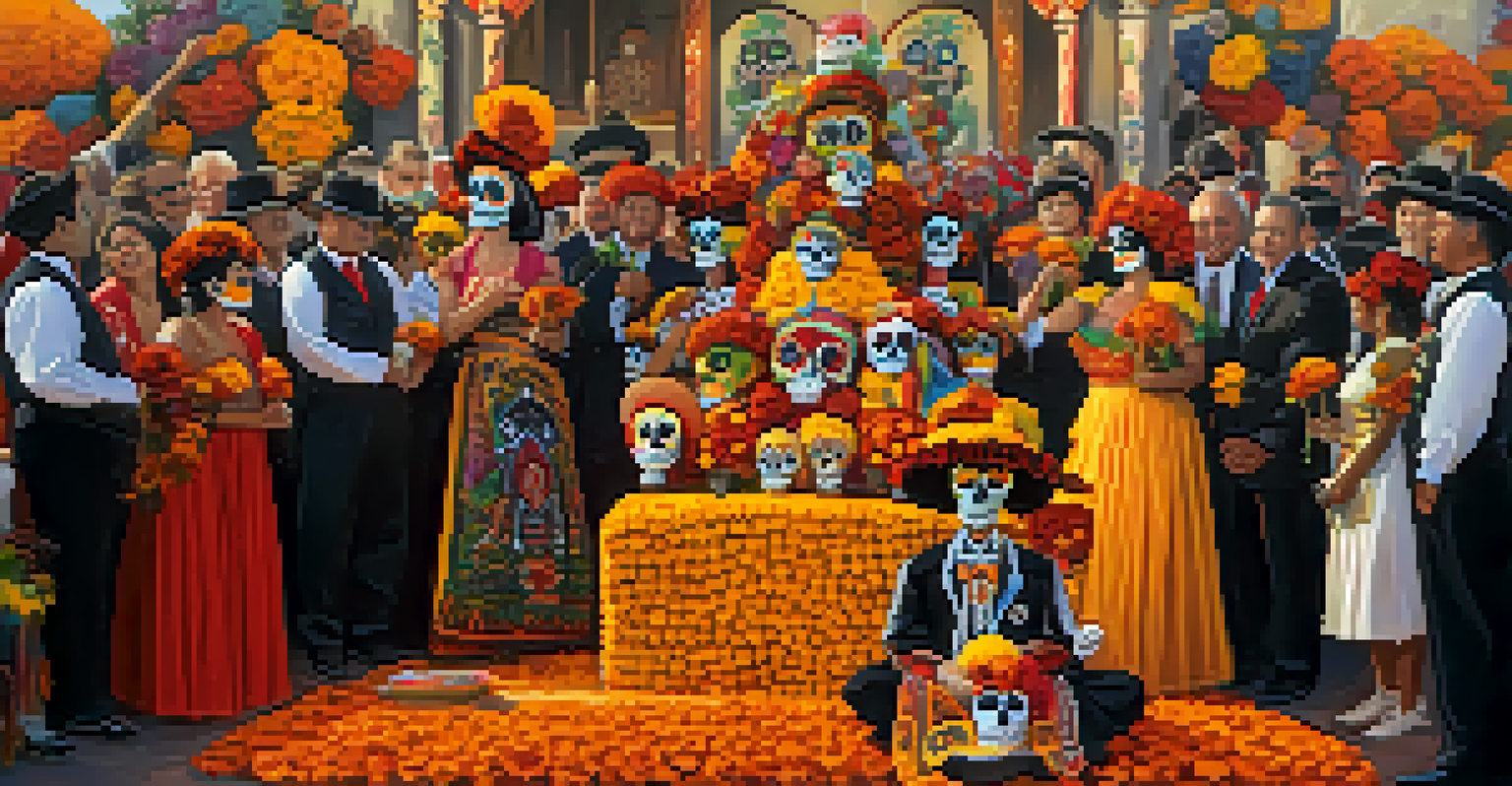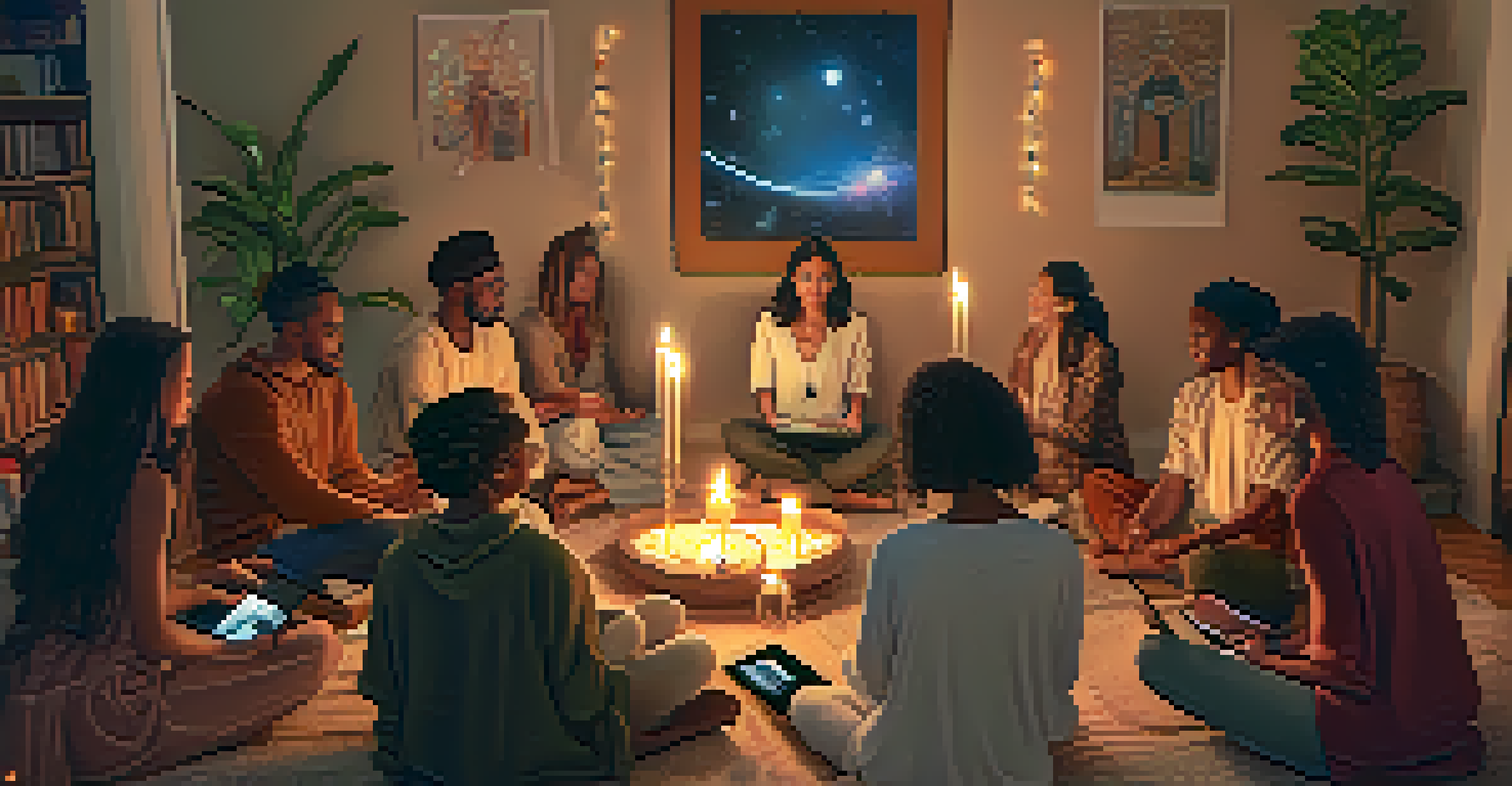Rituals and Rites: Their Evolution in Spiritual Practices

Understanding Rituals: The Heart of Spiritual Practices
Rituals are structured actions or ceremonies that hold significance in various spiritual practices. They often serve as a means for individuals and communities to connect with the divine or the universe. Think of rituals as a language of the soul, allowing people to express their beliefs and emotions in a tangible way.
Rituals are the formulas by which harmony is restored.
From simple daily routines to elaborate ceremonies, rituals can take many forms. They might include lighting candles, chanting mantras, or performing sacred dances. These activities not only honor spiritual beliefs but also create a sense of belonging among participants, linking them to a larger tradition.
Over time, the meanings and methods of rituals evolve, reflecting cultural shifts and personal interpretations. While some rituals remain unchanged, others adapt to fit modern contexts, making spirituality accessible to new generations.
The Role of Rites of Passage in Major Life Events
Rites of passage mark significant transitions in a person's life, such as birth, coming of age, marriage, and death. These ceremonies are often steeped in tradition and provide a framework for individuals to navigate life's changes. For example, a Bar or Bat Mitzvah in Judaism signifies a young person's entrance into adulthood, celebrated with family and community.

These rites serve not only to honor the individual but also to reinforce communal bonds. They help families and communities celebrate milestones together, fostering a sense of unity and shared experience. This collective acknowledgment can be incredibly empowering for the individual going through the transition.
Rituals Foster Community and Belonging
Rituals create a sense of unity and shared experience, helping individuals feel connected to their communities during significant life events.
As society evolves, the expressions of these rites can also change. Modern interpretations might incorporate personal elements or new cultural influences, ensuring that the essence of the rite remains relevant in today's world.
The Influence of Cultural Traditions on Rituals
Cultural backgrounds play a significant role in shaping the rituals and rites practiced by different communities. Each culture brings its unique symbols, practices, and beliefs, creating a diverse tapestry of spiritual expressions. For instance, the Day of the Dead in Mexico beautifully combines indigenous and Catholic traditions to honor deceased loved ones.
Ritual is the way we signify meaning and value beyond the mundane.
This blending of cultural elements often leads to the creation of new rituals that resonate with contemporary values while honoring ancestral practices. In a globalized world, many individuals find themselves drawing from multiple traditions, creating personal rituals that reflect their multifaceted identities.
However, it's essential to approach this blending with respect and understanding, recognizing the origins of each practice. A thoughtful integration can enrich spiritual experiences, offering fresh perspectives while honoring the roots of each tradition.
The Psychological Benefits of Participating in Rituals
Engaging in rituals can provide significant psychological benefits, offering a sense of order and control in an unpredictable world. When life feels chaotic, rituals can create predictable patterns that help individuals cope with stress and anxiety. This is why many people turn to rituals during tough times, such as lighting a candle for hope or performing a grounding meditation.
Additionally, rituals can serve as a form of self-care, promoting mindfulness and presence. The act of participating in a ritual encourages individuals to slow down and reflect, fostering a deeper connection to their inner selves and the world around them. This mindfulness can lead to enhanced emotional resilience and overall well-being.
Digital Age Transforms Spirituality
In today's fast-paced world, rituals have adapted to digital platforms, making spiritual practices more accessible while retaining their core meaning.
Moreover, the communal aspect of rituals can further amplify these benefits. Sharing experiences with others during a ritual can cultivate a sense of belonging and support, reinforcing social ties that are crucial for mental health.
Modern Spirituality: Rituals in a Digital Age
In today's fast-paced digital world, spirituality and rituals have adapted to fit our lifestyles. Many people now turn to online communities to share rituals, whether through virtual gatherings or social media challenges. This digital shift has made spiritual practices more accessible, allowing individuals to explore and engage with rituals from different cultures with just a click.
However, the essence of rituals remains unchanged – they still provide connection, meaning, and a sense of purpose. Whether it's participating in a live-streamed meditation or sharing personal stories of transformation online, technology offers new platforms for spiritual expression. This modern approach allows individuals to craft their unique blend of traditional and contemporary practices.
Despite this evolution, some may argue that digital rituals lack the depth and connection of in-person experiences. It's crucial to find a balance that honors both the traditional aspects of rituals while embracing the opportunities that technology offers.
Rituals as a Tool for Social Change
Rituals are not only personal expressions of spirituality; they can also be powerful catalysts for social change. Many movements, such as civil rights or environmental activism, have employed rituals to unify participants and convey their messages. For instance, protests often include chanting or symbolic actions that reinforce the collective spirit of the cause.
Through these shared experiences, participants feel a sense of purpose and solidarity. Rituals can encapsulate the values and goals of a movement, transforming abstract ideas into tangible actions that resonate with people. This emotional connection can inspire individuals to take part in social change, reminding them of their shared humanity.
Rituals Drive Social Change
Rituals serve as powerful tools for social movements, unifying participants and transforming collective ideals into tangible actions for change.
Moreover, rituals can help communities heal from trauma and injustice. By coming together to remember, celebrate, or advocate, groups can foster resilience and solidarity, reinforcing the belief that collective action can lead to meaningful change.
The Future of Rituals: Trends and Innovations
As we look to the future, rituals are likely to continue evolving in response to cultural shifts and technological advancements. Emerging trends suggest a growing interest in personalized rituals that reflect individual beliefs and lifestyles. This trend emphasizes the importance of authenticity, encouraging people to create practices that resonate with their unique experiences.
Additionally, there is an increasing focus on sustainability, with many spiritual communities seeking to incorporate eco-friendly elements into their rituals. This not only honors the Earth but also aligns with a growing awareness of environmental issues, making spirituality more relevant in today's context.

Ultimately, the future of rituals will likely be defined by a blend of tradition and innovation, honoring the past while embracing new ideas. As people seek deeper connections and meaning in their lives, rituals will continue to play a vital role in shaping spiritual practices across cultures.